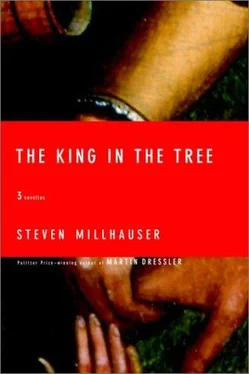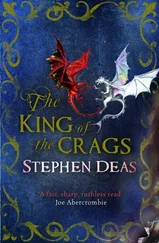When the lovers had advanced beyond earshot, I turned quietly and made my way back to the castle.
One detail I neglected to mention. Upon first seeing the pair, I had gripped my sword hilt, with the instinct of an old warrior. When I finally turned to go, I discovered that my hand was still on my sword, the fingers tense, the tendons thrust up, the muscles of my arm sore, as though I had just returned my sword to the scabbard after a battle.
Up at cockcrow, after little sleep. It is good, when the mind is troubled, to walk in the courtyard in the early morning. In the half-light of dawn, the grooms were sweeping out the stables. Peacocks and peahens strutted about. A servant was emptying a chamber pot into the cesspit. A second servant, carrying an armful of rushes for the floor of the great hall, climbed the outer stairway at the base of the keep and disappeared into the arch above. At a great wooden trough, the big-armed laundress was soaking tablecloths and sheets, which she would later pound and hang up to dry in the morning sun. Through the door of the forge I saw the smith examining a broken cart-axle. I stopped for a moment before the mews, to look through the small window at the falcons on their perches, the long-winged peregrines and gyrfalcons, the short-winged goshawks and sparrow hawks. I continued past the well, with its windlass and bucket; a hen fluttered up to the stone rim. The greyhounds were feeding in the kennels, barrels of live chickens stood piled by the kitchen gate, bales of sweet-smelling hay stood before the door of the granary, and on the high walls, against the graying sky, men-at-arms with crossbows were replacing the night watch.
In the afternoon I was alone with the King and did not speak. He waited for me to speak, but I spoke of other things. My silence I condemn as an act of treason against the crown. What bound my tongue was not doubt about whether I ought to speak, but the knowledge that, if I spoke, I would be guilty of an act of disloyalty to the Queen, whom I dislike, and to Tristan, whom I do not love as I love the King.
My duty is clear. Is my duty clear? I have no proof of adultery. Tristan is the Queen’s protector and is often alone with her. The King from the beginning has encouraged their intimacy, has repeatedly praised Tristan for attending to the Queen. What is it that I know? I know that the Queen and Tristan were walking together in the orchard late at night. Is this a fact to be lightly reported to a jealous and suspicious King, in an atmosphere of gossip and slander? A word from me, the King’s trusted counselor and companion, carries more weight than the malice of fools. It is also possible, however unlikely, that there are reasons for their nocturnal walk which, once understood, will set everything in a new light. I did not witness a kiss or a single embrace — merely the holding of hands, as if they were children. Perhaps the unusual hour, my mental agitation, the enchantment of moonlight, an overzealous imagination, a pardonable but highly questionable sense of foreboding, united to produce in my mind the troubling sensations of that night. I must observe them carefully, and accumulate more telling evidence before reporting to the King.
A madness of preparation has seized the court, diverting its attention from the Queen. The Count of Toulouse and some two hundred attendants will be arriving on these shores within the week and will lodge with us for some days before making their way to London. Oswin complains bitterly that there is no room in the stables, that the visitors will devour our pigs and sheep and capons, kill our deer, seduce our women, steal our treasure; he speaks as if he were anticipating a plague of locusts. The King laughs and orders him to spare no expense. Already, in the southwest field outside the castle walls, new stables are being erected. Bedchambers are being cleaned, tents set up, horses curried, walls hung with silks. Wagonloads of hay and grain roll in from the outlying farms. There is talk of feasting, games, entertainments of all kinds. The King hunts all day; Tristan visits in the women’s quarters, or is seen passing with the Queen and her handmaid into the Queen’s garden.
From high windows, ladies look out expectantly, searching for the first sign of movement on the horizon.
Is it possible I was mistaken? They walk together like the best of friends. No one speaks of them, in the tumult of preparation. Only now and again, as I step round a corner of the stables, or emerge from the shady arch of a doorway, I see the steward staring after them as they pass into the tower that opens into the Queen’s garden.
These men of Toulouse do nothing but sing, dance, and play from daybreak to midnight. Laughter rings out from every tent and stairway. Are they a race of children, these knights and nobles of Toulouse? No, in truth they care nothing for childhood: they are of a race who celebrate the joys of full-blooded youth. One can see it in their fashions, in their games and amusements. Their minstrels sing of love — only of love. Never do they sing of battles, of fallen heroes, of ruin and misery. Their songs know nothing of our stern world, with its bitter burdens and sorrows; for them all is youth, zephyrs, the green buds of a perpetual May. The Count is a man of fifty, who wears his unnaturally blond hair to his shoulders. He is said to be a musician and a scholar, a poet, a skilled chess player, a bold swordsman, a lover of the chase who never travels without his hawks. He presented to the King a silver ewer in the shape of a knight on a horse; when the ewer is filled with water and tipped, the water pours from the horse’s mouth. The Count and the King spend hours bent over the chessboard or walking in the King’s garden. Today they hunted in the forest, with a large company. The Count is good for the King, he distracts him from jealousy.
Last night the Count’s minstrel sang for us in the great hall, seated on a low stool and accompanying himself on a harp. The songs were all love songs, written by the Count himself. Afterward the King’s minstrel, seated on a cushion and accompanying himself on the vielle, sang an adventure of Reynard the Fox and Ysengrim the Wolf, which was well applauded. It was after this, as the singer rose to give way to a juggler of knives, that a curious incident took place. A stranger entered the hall, dressed like a pilgrim in a broad-brimmed hat and a hooded cloak, bearing in one hand an ashwood staff and carrying a harp on his back. Seashells were sewn onto his cloak, as a sign that he had traveled in distant lands; his feet were bare. He approached the Count and asked if he might play a song before the court. To the consternation of the King, the Count laughed and urged the pilgrim to entertain the company if he could. Thereupon the stranger took the harp from his back and played his melancholy song with such surpassing skill that the company listened in hushed wonder. When he had finished playing, there was great applause; the Count, visibly moved, said he had never before heard playing of that kind, and asked where he learned to play so well. “In Lyonesse,” replied the pilgrim, who at once tossed off his humble cloak, beneath which was a purple surcoat with silver sleeve-borders decorated with gold lions, and removed his pilgrim’s hat, revealing himself to be — Tristan. Then there was great laughter and rejoicing in the hall, for these men of Toulouse like nothing better than a bold and playful spirit.
It is only two days since my last entry, but everything has changed. Disaster has struck. The Count and his followers departed at daybreak. The spirit of revelry has been broken, the fraternal warmth between the Count and the King has suffered a chill. The Queen refuses to leave her chamber, the King paces alone in his garden, Modor sits in the tower prison. I am partly to blame, for I sensed trouble but was unable to foresee the direction from which it erupted.
Читать дальше












